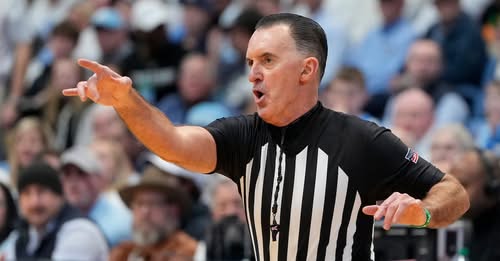Referees Often Get a Bad Rap, But What Roger Ayers Did for Liberty’s JC Shirer Jr. Was a Very Classy Gesture
Referees in basketball, like those in any sport, are often the subject of intense scrutiny. Their decisions, no matter how well-intentioned or accurate, can be the source of criticism from players, coaches, and fans alike. It’s not uncommon for a referee to be on the receiving end of harsh boos and complaints, as they’re expected to make split-second decisions that can sometimes determine the outcome of a game. But despite the tough nature of the job, many referees carry out their responsibilities with professionalism, and every now and then, an act of sportsmanship or kindness can shine through — reminding us that referees are more than just rule enforcers.
One such example of this came during a game between Liberty University and their opponent, when referee Roger Ayers displayed an act of class and kindness toward Liberty’s JC Shirer Jr. While the spotlight is usually on the players, it’s important to recognize that the world of sportsmanship extends beyond just the athletes. Ayers’ thoughtful gesture toward Shirer Jr. demonstrated the human side of refereeing and reminded us that referees are integral parts of the game, not just figures of authority.
The Situation That Sparked the Gesture
The game between Liberty and their opponent was fast-paced and high-energy, as is typical in college basketball. JC Shirer Jr., a promising young player for Liberty, had been putting on a solid performance, contributing to his team in significant ways. However, during a pivotal moment in the game, Shirer found himself in an unfortunate situation that left him feeling frustrated and down on himself.
In a key play, Shirer Jr. was involved in a controversial call — a foul that, in his eyes, seemed unfair. The kind of call that can leave a player questioning what happened and why. Players, especially young ones, can sometimes let their emotions get the best of them in these moments. As Shirer Jr. expressed his frustration, a typical scene unfolded: the referee blew the whistle, signaling that a foul had been committed, but what followed was far from typical.
Roger Ayers Steps In
Roger Ayers, a seasoned referee with years of experience, noticed the tension in the air. Instead of just going through the motions, making the call, and moving on, Ayers took a moment to address Shirer Jr.’s frustrations. Recognizing the young player’s visible disappointment, Ayers decided to approach him not as an enforcer of rules, but as a mentor — someone who could offer a kind word in a moment of emotional turmoil.
Ayers quietly walked up to Shirer Jr., and rather than immediately issuing a stern reprimand or shrugging off the young player’s concerns, he took a few extra seconds to offer some advice. He reassured Shirer, letting him know that while the call might not have gone his way, it wasn’t the end of the world. Ayers’ calm and composed demeanor helped ease the tension in the moment and allowed Shirer to regain his focus.
This act wasn’t just about soothing an angry player; it was a reminder that referees, like players and coaches, are part of the emotional landscape of the game. Referees understand the high stakes and the pressure that players face — and sometimes, a small gesture of empathy can go a long way in making sure that the player stays focused on the bigger picture: the game itself.
A Class Act Beyond the Court
What Ayers did that day transcended the traditional role of a referee. He wasn’t just calling fouls and making decisions — he was demonstrating true sportsmanship. In a time when athletes are often expected to be “tough” and “resilient,” it’s easy to forget that they’re human beings, too. The pressure of performing, especially in critical moments, can cause even the most experienced players to lose their composure. Having a referee who not only understands that but is willing to help calm the storm is a rare and admirable quality.
While Ayers’ act may have been small, it was impactful. In an environment where emotions often run high, it’s easy for moments of frustration to spiral into something more negative. But by taking a few seconds to address the situation, Ayers reminded everyone present — players, coaches, and fans — of the importance of sportsmanship, even in the midst of competition.
Shirer Jr., who might have walked away from the call feeling defeated, was instead given the opportunity to reset his mindset and re-engage in the game. It’s not every day that a referee extends a gesture like this, but when they do, it reminds everyone of the respect and professionalism that can be present in every aspect of the game — including the officials.
Referees Are Part of the Game’s Fabric
It’s easy to be critical of referees — they’re the ones who make the calls that shape the flow of a game, and their decisions often carry significant consequences. But just like players and coaches, referees are human beings, and their involvement in the game goes beyond simply enforcing the rules. Referees have a responsibility to manage the game and ensure that it’s played fairly, but they also play a role in upholding the integrity and values of sportsmanship.
When referees act with dignity and respect, as Roger Ayers did with JC Shirer Jr., it highlights that their role is far from one-dimensional. They are not just there to blow whistles and make calls, but to be a part of the experience — to contribute to the atmosphere and spirit of the game.
In the case of Ayers’ interaction with Shirer Jr., it wasn’t just a teaching moment for the player; it was a reminder to everyone watching that the game is about more than just winning or losing. It’s about how players, coaches, and officials interact with one another, how they respond to adversity, and how they contribute to the overall culture of the sport. What Ayers did for Shirer was a shining example of how sportsmanship isn’t confined to just the players.
The Impact of Sportsmanship
Sportsmanship is a concept that extends far beyond the court or field. It shapes how athletes, coaches, and officials engage with each other and with fans. A moment like the one between Ayers and Shirer Jr. proves that it’s possible for all involved in a sporting event to elevate the experience, turning what could be a moment of frustration into an opportunity for personal growth and reflection.
In an era where the pressures on athletes are immense and the scrutiny of their every move is under a microscope, small acts of kindness like this one can make a huge difference. For a young player like Shirer Jr., who may be experiencing the highs and lows of college basketball for the first time, the support of a referee — someone who has seen it all — can be a game-changer, both for his mentality on the court and his growth as a person.
It’s also a reminder that referees are not the enemy, but rather integral figures in the game. They provide structure and order, allowing the players to shine and the game to unfold. When fans and players alike are quick to blame referees for mistakes or missed calls, it’s important to remember that their role is multifaceted. They are there to protect the integrity of the game and ensure that it’s played fairly, and sometimes, like in Ayers’ case, they go the extra mile to teach and inspire.
Roger Ayers’ gesture toward JC Shirer Jr. is an example of the type of sportsmanship that often goes unnoticed in the world of competitive sports. Referees rarely receive the praise they deserve, especially when they show empathy and compassion in moments that could otherwise be filled with tension and frustration. But Ayers’ class act serves as a reminder that referees, too, are part of the broader sports community. They’re not just rule enforcers; they’re also mentors, guides, and sometimes, the calming influence a young player needs to regain their focus and confidence.
In a game where emotions often run high, what Ayers did for Shirer Jr. was a true display of sportsmanship, and it’s a gesture that will likely be remembered by Shirer and anyone who witnessed it. It’s these kinds of moments — small but meaningful — that help to elevate the spirit of competition and remind us of the value of respect in the world of sports.



